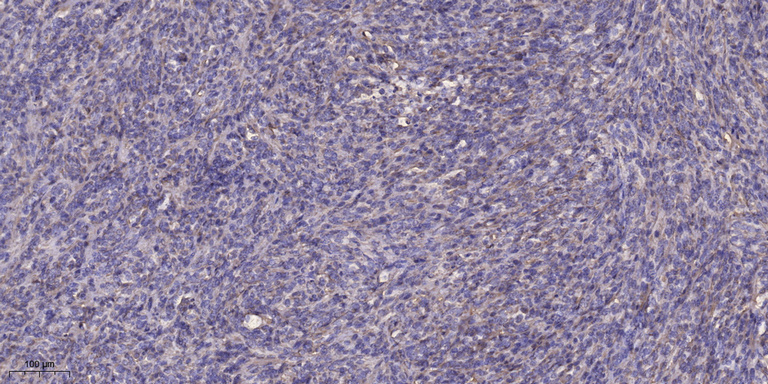CA VIII Polyclonal Antibody
- Catalog No.:YT0579
- Applications:WB;IHC;IF;ELISA
- Reactivity:Human;Mouse;Rat
- Target:
- CA VIII
- Fields:
- >>Nitrogen metabolism;>>Metabolic pathways
- Gene Name:
- CA8
- Protein Name:
- Carbonic anhydrase-related protein
- Human Gene Id:
- 767
- Human Swiss Prot No:
- P35219
- Mouse Gene Id:
- 12319
- Mouse Swiss Prot No:
- P28651
- Rat Gene Id:
- 297814
- Rat Swiss Prot No:
- Q5PPN4
- Immunogen:
- Synthesized peptide derived from the Internal region of human CA VIII.
- Specificity:
- CA VIII Polyclonal Antibody detects endogenous levels of CA VIII protein.
- Formulation:
- Liquid in PBS containing 50% glycerol, 0.5% BSA and 0.02% sodium azide.
- Source:
- Polyclonal, Rabbit,IgG
- Dilution:
- IHC: 100-300.WB 1:500 - 1:2000. ELISA: 1:40000.. IF 1:50-200
- Purification:
- The antibody was affinity-purified from rabbit antiserum by affinity-chromatography using epitope-specific immunogen.
- Concentration:
- 1 mg/ml
- Storage Stability:
- -15°C to -25°C/1 year(Do not lower than -25°C)
- Other Name:
- CA8;CALS;Carbonic anhydrase-related protein;CARP;Carbonic anhydrase VIII;CA-VIII
- Molecular Weight(Da):
- 33kD
- Background:
- The protein encoded by this gene was initially named CA-related protein because of sequence similarity to other known carbonic anhydrase genes. However, the gene product lacks carbonic anhydrase activity (i.e., the reversible hydration of carbon dioxide). The gene product continues to carry a carbonic anhydrase designation based on clear sequence identity to other members of the carbonic anhydrase gene family. The absence of CA8 gene transcription in the cerebellum of the lurcher mutant in mice with a neurologic defect suggests an important role for this acatalytic form. Mutations in this gene are associated with cerebellar ataxia, mental retardation, and dysequilibrium syndrome 3 (CMARQ3). Polymorphisms in this gene are associated with osteoporosis, and overexpression of this gene in osteosarcoma cells suggests an oncogenic role. Alternative splicing results in multiple transcript variants. [provid
- Function:
- function:Does not have a carbonic anhydrase catalytic activity.,similarity:Belongs to the alpha-carbonic anhydrase family.,
- Subcellular Location:
- cytoplasm,
- June 19-2018
- WESTERN IMMUNOBLOTTING PROTOCOL
- June 19-2018
- IMMUNOHISTOCHEMISTRY-PARAFFIN PROTOCOL
- June 19-2018
- IMMUNOFLUORESCENCE PROTOCOL
- September 08-2020
- FLOW-CYTOMEYRT-PROTOCOL
- May 20-2022
- Cell-Based ELISA│解您多样本WB检测之困扰
- July 13-2018
- CELL-BASED-ELISA-PROTOCOL-FOR-ACETYL-PROTEIN
- July 13-2018
- CELL-BASED-ELISA-PROTOCOL-FOR-PHOSPHO-PROTEIN
- July 13-2018
- Antibody-FAQs
- Products Images

- Immunohistochemical analysis of paraffin-embedded human Colon cancer. 1, Antibody was diluted at 1:200(4° overnight). 2, Tris-EDTA,pH9.0 was used for antigen retrieval. 3,Secondary antibody was diluted at 1:200(room temperature, 45min).



